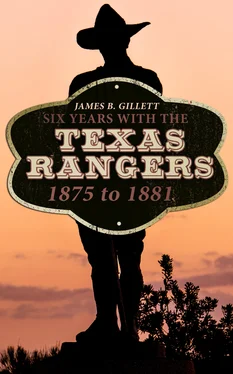James B. Gillett - Six Years With the Texas Rangers - 1875 to 1881
Здесь есть возможность читать онлайн «James B. Gillett - Six Years With the Texas Rangers - 1875 to 1881» — ознакомительный отрывок электронной книги совершенно бесплатно, а после прочтения отрывка купить полную версию. В некоторых случаях можно слушать аудио, скачать через торрент в формате fb2 и присутствует краткое содержание. Жанр: unrecognised, на английском языке. Описание произведения, (предисловие) а так же отзывы посетителей доступны на портале библиотеки ЛибКат.
- Название:Six Years With the Texas Rangers: 1875 to 1881
- Автор:
- Жанр:
- Год:неизвестен
- ISBN:нет данных
- Рейтинг книги:3 / 5. Голосов: 1
-
Избранное:Добавить в избранное
- Отзывы:
-
Ваша оценка:
- 60
- 1
- 2
- 3
- 4
- 5
Six Years With the Texas Rangers: 1875 to 1881: краткое содержание, описание и аннотация
Предлагаем к чтению аннотацию, описание, краткое содержание или предисловие (зависит от того, что написал сам автор книги «Six Years With the Texas Rangers: 1875 to 1881»). Если вы не нашли необходимую информацию о книге — напишите в комментариях, мы постараемся отыскать её.
Six Years With the Texas Rangers: 1875 to 1881 — читать онлайн ознакомительный отрывок
Ниже представлен текст книги, разбитый по страницам. Система сохранения места последней прочитанной страницы, позволяет с удобством читать онлайн бесплатно книгу «Six Years With the Texas Rangers: 1875 to 1881», без необходимости каждый раз заново искать на чём Вы остановились. Поставьте закладку, и сможете в любой момент перейти на страницу, на которой закончили чтение.
Интервал:
Закладка:
Sketchy as has been this history, it will show a ranger record of continuous duty throughout the forty-six years of its existence in guarding the lives, the liberty and the property of Texas citizens. And the ranger has been content to perform his duty unheralded and almost unsung. Performance of duty, it matters not where it may lead him, into whatever desperate situation or howsoever dangerous the thing demanded, has always been the slogan of the organization. For courage, patriotic devotion, instant obedience and efficiency, the record of the Texas Ranger has been equaled by no body of constabulary ever mustered.
Though formed into military units and officered as a soldier, the ranger is not a military man, for scant attention is paid to military law and precedent. The state furnished food for the men, forage for their horses, ammunition and medical attendance. The ranger himself must furnish his horse, his accoutrements and his arms. There is, then, no uniformity in the matter of dress, for each ranger is free to dress as he pleases and in the garb experience has taught him most convenient for utility and comfort. A ranger, as any other frontiersman or cowboy, usually wears good heavy woolen clothes of any color that strikes his fancy. Some are partial to corduroy suits, while others prefer buckskin. A felt hat of any make and color completes his uniform. While riding, a ranger always wore spurs and very high-heeled boots to prevent his foot from slipping through the stirrup, for both the ranger and the cowboy ride with the stirrup in the middle of the foot. This is safer and less fatiguing on a long ride. For arms, the ranger after 1877 carried a Winchester rifle or carbine, a Colt's .45 revolver, and a Bowie knife. Two cartridge belts, one for Winchester and one for revolver ammunition, completed his equipment, and so armed he was ready to mount and ride.
"We live in the saddle and the sky is our roof," say the old rangers, and this is literally true. The rangers are perfect centaurs and almost live in the saddle. They take horse where they will and may arrest or search in any part of the state. There is very little of what a West Point graduate would call drill. A ranger is expected simply to be a good rider and a quick and accurate shot. Every one of them are skilled horsemen and crack shots. No crack cavalryman in any army can mount a horse more quickly or more expertly than a ranger, and he can keep a constant stream of fire pouring from his carbine when his horse is going at top speed and hit the mark nine times out of ten! Should a ranger drop anything on the ground that he wants he does not even check the speed of his horse, but, bending from the saddle as if he were made of India rubber, he picks up the object in full gallop.
While not on active duty the rangers amuse themselves in various ways. Some play cards, others hunt, while the studious spend their time over books and good literature. Horse racing is popular, and the fastest horse in the company is soon spotted, for the rangers match their mounts one against the other. At night around their camp fires the men are constantly telling stories of their own or some comrade's adventures that put to shame all the inventions of the imaginative fiction writers. But when on duty all this is changed. No pace is too quick, no task too difficult or too hazardous for him. Night and day will the ranger trail his prey, through rain and shine, until the criminal is located and put behind the bars where he will not again molest or disturb peaceful citizens. For bravery and endurance and steadfast adherence to duty at all times the ranger is in a class all to himself. Such was the old ranger, and such is the ranger of today. Is it surprising, then, that I was early attracted to the force and wished to join them in their open, joyous and adventurous life?
CHAPTER III
I JOIN THE RANGERS
Table of Contents
The fame of the Texas Rangers had, of course, become common knowledge among all Texans. Their deeds of adventure and their open, attractive life along the frontier, had always appealed to me, and I had long cherished the desire to enlist in the battalion. But the enlistment, as announced by Captain Roberts, would not be made until June 1, 1875, and I reached Menardville early in March. I had intended going on to join Mr. Franks' outfit, but, as explained in a previous chapter, I hired out to Mr. Ellis until I could enlist in Captain Roberts' company.
About the middle of May, 1875, Joe Franks had worked back over into Menard County. I wished to see my old friends in his outfit, and so went over to meet them. While there I mentioned that I was going to join the rangers. A cowboy named Norman Rodgers, who was working for Mr. Franks, said he would also like to join, so we decided we would go over to Captain Roberts together and see if we couldn't get him to recruit us into his company.
Rodgers and I rode over to the ranger camp beyond Menardville. Neither of us had ever been in such a camp before nor did we know anyone in the company. Of the first ranger we met we inquired where we could find the captain. His tent was pointed out to us and we went toward it.
"Jim," said Norman as we approached the tent, "you will have to do the talking."
Captain Roberts met us as we came up and invited us to be seated. I told him at once that we had come to enlist as rangers. He asked us our names, where we were working, and finally inquired if we had anyone that would recommend us. We had not thought of references, but told him that probably Mr. Franks or Mr. Ellis would stand for us, as they were well known and prominent cattlemen for whom we had worked.
Captain Roberts looked straight at me and said, "Did you say your name was Gillett?"
"Yes, Jim Gillett," I replied.
He then asked me where I was born, and I told him at Austin, Texas.
"Are you a son of James S. Gillett who was Adjutant-General under Governor Sam Houston?"
I told him I was.
"I have often heard my father, Buck Roberts, speak of your father," he said in a friendly tone.
Captain Roberts then asked us what kind of horses we had, telling us that a ranger was required to have a good amount, for each man was allowed to have only one horse, which had to be a good one, that could be ridden every day for a month if necessary. I told the captain I had two good pony mares. He burst out laughing, and said a mare was not allowed in the service. He then told us to go and see what kind of a mount we could get, come back and let him inspect the animals. The captain never once said he would enlist us, but, as the interview was now over and he had not refused us, we went back to camp feeling very hopeful we would soon be rangers.
I secured a big black pony and Norman a gray one, not so large as mine but a much prettier horse. We returned to the ranger camp a few days later mounted on these ponies. The captain looked them over, said they were rather small but that he would accept them, and told us to be at his camp by May 31st to be sworn into the service. We left camp that evening all puffed up at the prospect of being Texas Rangers.
The last day of May arrived. Norman Rodgers and myself with many other recruits we had never seen before were at the ranger camp. On June 1, 1875, at 10 o'clock, we were formed in line, mounted, and the oath of allegiance to the State of Texas was read to us by Captain Roberts. When we had all signed this oath we were pronounced Texas Rangers. This was probably the happiest day of my life, for I had realized one of my greatest ambitions and was now a member of the most famous and efficient body of mounted police in the world.
Immediately upon being sworn in the men were divided into messes, ten men to the mess, and issued ten days' rations by the orderly sergeant. These rations consisted of flour, bacon, coffee, sugar, beans, rice, pepper, salt and soda. No potatoes, syrup or lard was furnished, and each man had to supply his own cooking utensils. To shorten our bread we used bacon grease. Beef was sometimes supplied the men, but wild game was so plentiful that but little other meat was required. Furthermore, each recruit was furnished a Sharps carbine. .50 caliber, and one .45 Colt's pistol. These arms were charged to each ranger, their cost to be deducted from our first pay. Our salary of $40 per month was paid in quarterly installments. The state also supplied provender for the horses.
Читать дальшеИнтервал:
Закладка:
Похожие книги на «Six Years With the Texas Rangers: 1875 to 1881»
Представляем Вашему вниманию похожие книги на «Six Years With the Texas Rangers: 1875 to 1881» списком для выбора. Мы отобрали схожую по названию и смыслу литературу в надежде предоставить читателям больше вариантов отыскать новые, интересные, ещё непрочитанные произведения.
Обсуждение, отзывы о книге «Six Years With the Texas Rangers: 1875 to 1881» и просто собственные мнения читателей. Оставьте ваши комментарии, напишите, что Вы думаете о произведении, его смысле или главных героях. Укажите что конкретно понравилось, а что нет, и почему Вы так считаете.












